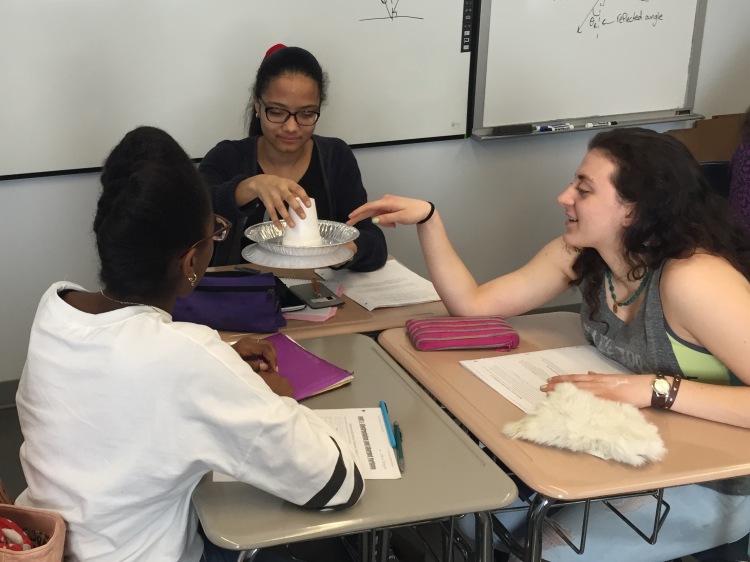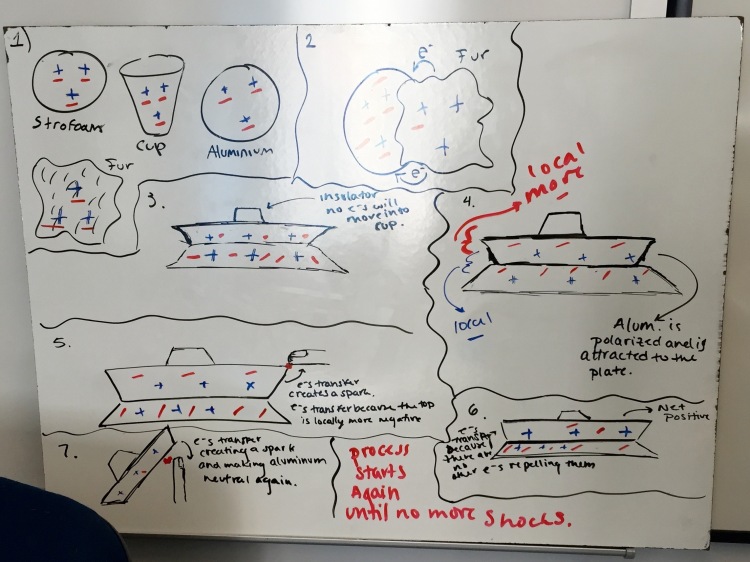This entry was originally posted at https://kellyoshea.wordpress.com/2015/04/27/what-if-we-didnt-finish-all-of-the-questions/
My Physics 10 (a trimester-long class exploring E&M topics for 10th graders who haven’t yet studied mechanics) was wrapping up some extensions to an electrophorus activity. They were already pros at explaining and predicting electrostatic phenomena, but this activity gave them yet another way to test out their thinking, practice their charge diagrams, and add depth and subtlety to their understanding. (I adapted instructions and ideas from this activity that I found in a quick search and that I had left for students last trimester when I needed to miss a day of their class.)
On the first day, they built and explained the electrophorus.

They made whiteboards at each table to work through the step-by-step charge situation.

On the second day, one group talked us through their whiteboard. (They were ready to present it at the end of the first day, but as soon as they got everyone paying attention to them, the fire alarm went off for a drill.)
After that, they went to work on some extensions. They tested the pan and the plate against Upper Tape and Lower Tape. They made an aluminum foil person with hair (as described in the document) and explained their observations when they tested it out. One group took their entire apparatus to the bathroom (which doesn’t have windows) because they wanted to know if you could see the sparks when you got shocked. Some groups tested pieces of their setups against other groups. Some got more involved in the foil person. Some only barely got started with the foil person. Some followed the prompts given by questions that I had put in their packets. Some ran off to test their own ideas.
When it was time to clean up the classroom, one group stopped me and asked, “Kelly, what if we didn’t finish all of the questions?”It was one of those great moments when a student helps you clarify something you’ve been doing, even doing intentionally, but hadn’t verbalized or made explicit before (even for yourself).
So here’s what we talked about. If you didn’t finish the questions, that’s okay. That’s generally always okay. No question is really that important. None of the questions are important? Well, none of them are important on their own. No packet falls apart from not doing one of them. The knowledge we are building isn’t so fragile as all of that. We’re building in redundancies in our explorations. We’re constructing ideas and then testing them multiple times and in multiple ways. We’re reconstructing these ideas. We’re modifying them. We’re strengthening them.
Maybe you noticed something peculiar about how this class is structured. Probably for the first few days, you left thinking, “Well… okay. I was able to do what we were doing, and it was fun, but I don’t think I really get it.” Um, yep! It was probably like that for a few days, and then all of the sudden, it really started clicking. And now you feel strongly that you really understand what you’re doing. True, true. It kind of layers itself like that. It takes a little while, but then you really, really get it.
I brought up the same idea that afternoon in my 9th grade math class. (They are doing “mixed martial problem solving” all year with problems from a few different awesome sources.) It’s okay if you don’t do every problem in the problem set. It’s not okay if you opt out of the ones you think are hardest. It’s not okay if you do none of the problems. But it’s okay if you don’t get to do every problem. We’re building something that is strong enough anyway.


So interesting, Kelly! We’ve often talked about the resilience and heartiness we expect of students – I like thinking about the heartiness of the tasks we develop as teachers. On one hand, the understanding and knowledge doesn’t hinge precariously on one single question. On the other hand, no questions are unimportant – we’re asking deep and perplexing questions. Maybe part of it is reconsidering when and where students think the learning stops. So you don’t ‘finish’ a question in the packet. That just means you have more to wonder about outside of class, later on, or in your next physics lab.
Kelly, I love this idea: “The knowledge we are building isn’t so fragile as all of that.” It takes the focus off the perfectionist impulse we all have (MUST DOT ALL THE “I”s) and refocuses on the much more fundamental learning processes that undergird the daily work. I also love that you encourage them to stew for a while in the not-knowing, and that, in doing so, they learn to trust that the knowing will come if they stick with it.
Kelly, thanks for posting. There is much here that has me thinking; I think that Ana and Heather’s comments also point to two important loci of resiliency: in the student’s themselves and in the learning activities created by the teacher. I think that both need to be flexible, open to ambiguity and grounded in a larger purpose. Your response back to your students also shifts the focus of the question back to what should be the focus of our work, which is learning. Questions about completing all of the questions in the packet, or asking what will be on the test are about schooling . It is fair for kids to ask these questions because sometimes (maybe more than we’d like to admit) we craft activities that have kids engaged, but have learning goals that may be less clear. In other cases, our student’s natural tendency to please us (i.e., to do all the questions), prevents them from doing the deeper and more demanding work of really making sense of the area of inquiry at hand. Thanks for the provocation.